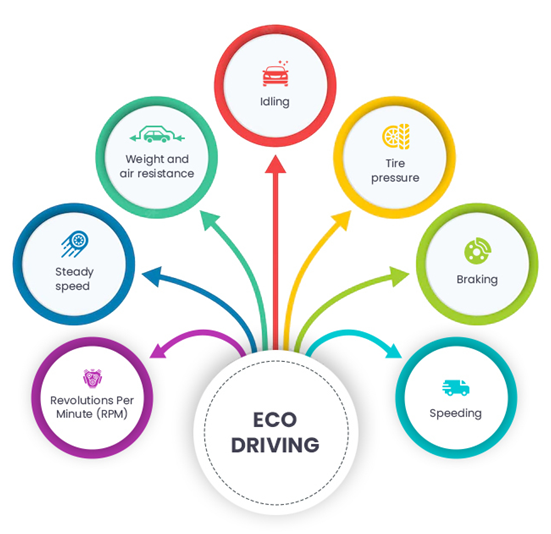Summer is around the corner! For many Americans, it is the time for long road trips. However, with gasoline and diesel prices rising to levels not experienced in the United States before, the price of fuel has become a real financial concern for a growing number of Americans.
Whether or not fuel prices will stabilize in the near future, there has been a renewed interest among consumers in improving vehicle fuel economy. More than 172 billion gallons of fuel has been consumed by US vehicles in 2009 (Federal Highway Administration of the US Department of Transportation). Studies suggests that on-road fuel economy greatly suffers due to changes in driving style or vehicle maintenance.
Eco-Driving Effects on Fuel Consumption & Economy
While driving behavior is one of the most crucial factors influencing fuel use, its impact is often paid less attention to. Adopting ecological driving behavior can greatly reduce the amount of fuel used by vehicles. The variables used to demonstrate driving style include speed, acceleration, or deceleration, among others. The level of speed can affect fuel consumption, considering that each engine has an optimal range of speed value, at which it operates with optimal efficacy. Fuel consumption at a very low speed is higher due to increased heat loss, whereas at very high speeds; it increases further due to friction losses in the engine. On the other hand, fuel consumption is also higher when the vehicle is driven at a high speed.
Frequent deceleration may result in frequent acceleration. Thus, more fuel is used to increase kinetic energy and restore the vehicle’s speed. Moreover, during harsh acceleration, the engine operates at a higher speed, which again increases fuel consumption.
Idling is yet another contributing factor to fuel consumption. Motorists are, therefore, urged to switch off their vehicles’ engines if it is to remain stopped for more than half a minute. This is because the fuel required to start the engine is a lot less than that consumed if the engine was running.
Eco-Driving Best Practices

Revolutions Per Minute (RPM): Driving in the highest gear at the lowest RPM can make a difference. The lower the RPM, the lower the fuel consumption is due to friction.
Steady speed: Fuel consumption is higher during acceleration. Hence, it is beneficial to avoid frequent braking and accelerating and maintain a steady speed throughout.
Weight and air resistance: Both tend to increase the load on the engine, leading to higher fuel consumption. As a starter, clear up your car by removing all the stuff sitting idle in the trunk.
Idling: Modern vehicles’ engines are more efficient, and can perform well without the need for idling. Data shows that a compact sedan car with 2 litre engine size consumes 0.16 gallons per hour of fuel at idle without using accessories like air conditioners (the US Department of Energy). Therefore, it is more fuel-efficient to turn off the engine than leave it running.
Tire pressure: Low tire pressure increases the vehicle’s rolling resistance, which further translates into increased fuel consumption. So, get air and keep the tires at the recommended tire pressure.
Braking: Slowing down the vehicle with the use of an engine brake or the neutral gear instead of the actual brakes is a great practice. This is because no fuel is consumed when the engine brake is used in modern vehicles.
Speeding: Fuel consumption tends to increase at higher speeds. Therefore, drivers should always drive at or below the speed limit.
Leveraging Real-Time Vehicle Tracking Technology
Driver behavior is the most significant contributor to improving fuel economy of a vehicle. Speeding, idling, and inappropriate use of the accelerator & brake pedal - all contribute to inefficient fuel consumption. Improved fuel-efficient driving habits including not speeding, and not driving aggressively are among the most beneficial measures one can take to reduce costs.
Technologies such as a car GPS tracking device that help reduce fuel consumption and encourage responsible driving habits have massive potential. Today’s businesses and consumers increasingly rely on real-time vehicle tracking technology to keep track of the key fuel and safety performance variables. In fact, average fleet fuel economy improves up to 15% with the help of real-time vehicle tracking devices (the US Department of Energy).
Thanks to the Vyncs connected car tracking device, users can explore unique ways to improve driver performance and increase fuel economy by having access to a great variety of data. To ensure you get the most of your fuel, create an account on Vyncs today. Learn more about us here.